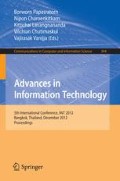Abstract
CIO role is important to ICT success in higher education. However perception of CIO Role effectiveness could be affected by culture, this research identified relationship between cultural dimensions and perceived CIO Role Effectiveness. This research follows cultural dimensions proposed by Hofstede [1]. Assessment of CIO role effectiveness follows method proposed by Kishen [2]. Samples are selected from of CIO or ones with potential to be CIO from 3 selected universities in Thailand and Vietnam. Three selected universities represent culture differences of equivalent to culture of 6 countries from 10 ASEAN countries. In terms of cultural differences among CIO in ASEAN, the research found that they are totally different in Long-Term Orientation but they are similar in Masculinity and Indulgence. For relation between cultural dimension and perceived CIO role effectiveness, it is found that Masculinity has negative effect on Perceived CIO Role Effectiveness, but Long-term orientation and Indulgence have significantly effect on Perceived CIO Role Effectiveness. As human resources in ASEAN will be more unified upon the beginning of ASEAN Economic Community in 2015, this research reveals that CIO role in higher education in different ASEAN countries will be perceived differently, in term of role effectiveness. The research also reveals that any CIO who wants to be perceived as effective CIO in ASEAN should perform their role in the way to enhance Long-Term Orientation and Indulgence, while decrease Musculinity.
Access this chapter
Tax calculation will be finalised at checkout
Purchases are for personal use only
Preview
Unable to display preview. Download preview PDF.
References
Hofstede, G.: Culture’s consequences: Comparing values, behaviors, institutions and organizations across nation, 2nd edn. Sage Publication (2001)
Kishen, P.I.: The Effect of Leadership Style on CIO Effectiveness, Dissertation, University of Texas at Arlington (2007)
Hayes, D.N.A.: ICT and learning: Lessons from Australian classrooms. Computers & Education 49, 385–395 (2007)
Jamian, M.: Malaysian Public University Learning Environments: Assessing Conduciveness through ICT Affordances. Procedia - Social and Behavioral Sciences 35, 154–161 (2012)
DeLone, W.H., McLean, E.R.: The DeLone and McLean model of information systems success: A ten year update. Journal of Management Information Systems 19(4), 9–30 (2003)
Thite, M.: Leadership styles in information technology projects. International Journal of Project Management 18, 235–241 (2000)
Cho, J., Park, I., Michel, J.W.: How does leadership affect information systems success? The role of transformational leadership. Information & Management 48, 270–277 (2011)
Weber, M.: The sociology of religion. Beacon, New York (1923/1963)
Burns, J.M.: Leadership. Harper &Row, New York (1978)
Yammarino, F.J., Bass, B.M.: Transformational leadership and multiple levels of analysis. Human Relations 43(10), 975–995 (1990)
Ergeneli, A., Gohar, R., Temirbekova, Z.: Transformational leadership: Its relationship to cultural value dimensions. International Journal of Intercultural Relation 31(1), 703–724 (2007)
Smaltz, D.H., Sambamurthy, V., Agarwal, R.: The Antecedents of CIO Role Effectiveness in Organizations: An Empirical Study in the Healthcare Sector. IEEE Transactions on Engineering Management 53(2), 207–222 (2006)
Jain, A.: Towards a Systemic View of an Organization’s Dynamic IT Capability. Dissertation, University of Texas at Arlington (2007)
Kishen, P.I.: The Effect of Leadership Style on CIO Effectiveness. Dissertation, University of Texas at Arlington (2007)
The ASEAN Secretariat, The ASEAN Economic Community (AEC), http://www.aseansec.org/18757.htm (retrieved July 10, 2012)
Hofstede, G.: Motivation, Leadership and organization: Do American theories apply aboard? In: Organizational Dynamics, pp. 42-63 (Summer 1980)
Smith, P.B., Peterson, M.F.: Leadership, organization and culture: An event management model. Sage, London (1988)
Javidan, M., House, R.J.: Cultural acumen for the global manager: Lessons from project GLOBE. Organ. Dynamic. 29(4), 289–305 (2001)
Hofstede, G.: Culture’s consequences: Comparing values, behaviors, institutions and organizations across nation, 2nd edn. Sage Publication (2001)
Hofstede, G., Hofstede, G. J., Minkov, M., Vinken, H: VSM08 Values Survey Module 2008 Questionnaire English Version (2008), http://www.geert-hofstede.nl/vsm-08 (retrieved June 10, 2012)
Synnott, W.R.: Putting a CIO in charge. Institutional Investor: Financial Technology Forum Supplement (21), 47–48 (1987)
Boyle, R.D., Burbridge Jr., J.J.: Who needs a CIO. Information Strategy: The Executive’s Journal 7(4), 12–18 (1991)
Rockart, J.F.: The Changing Role of the Information Systems Executive: A Critical Success Factors Perspective. Sloan Management Review 24(1), 3–13 (1982)
Chun, M., Mooney, J.: CIO roles and responsibilities: Twenty-five years of evolution and change. Information & Management 46, 323–334 (2009)
Ubon Rachathani Province, General Information, http://www.ubonratchathani.go.th/ (retrieved June 10, 2012)
Yala Province, General Information, http://www.yala.go.th/webyala/SiteMap/Region.html (retrieved June 10, 2012)
Author information
Authors and Affiliations
Editor information
Editors and Affiliations
Rights and permissions
Copyright information
© 2012 Springer-Verlag Berlin Heidelberg
About this paper
Cite this paper
Yokkhun, A., Inthasaeng, K., Duemong, F., Chutimasakul, W., Papasratorn, B. (2012). Cultural Difference and Perceived CIO Role Effectiveness in Higher Education in ASEAN. In: Papasratorn, B., Charoenkitkarn, N., Lavangnananda, K., Chutimaskul, W., Vanijja, V. (eds) Advances in Information Technology. IAIT 2012. Communications in Computer and Information Science, vol 344. Springer, Berlin, Heidelberg. https://doi.org/10.1007/978-3-642-35076-4_18
Download citation
DOI: https://doi.org/10.1007/978-3-642-35076-4_18
Publisher Name: Springer, Berlin, Heidelberg
Print ISBN: 978-3-642-35075-7
Online ISBN: 978-3-642-35076-4
eBook Packages: Computer ScienceComputer Science (R0)

